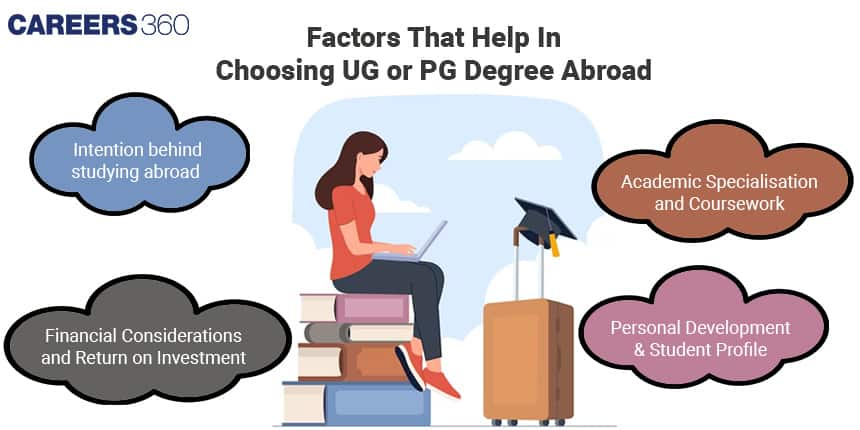Solve The Conundrum Of Pursuing Undergraduate Or Postgraduate Degree Abroad
As overseas education becomes accessible, students are facing an issue of having an abundance of choices. Choosing the correct country, university, academic specialisation, and degree type is a tedious process. However, the decision on when to finally apply to universities abroad is as important as any other. A couple of decades ago, this situation was not as complex – postgraduate degrees were more accessible, visible, and had a far better return on investment. However, with increased economic development and globalisation, foreign countries have recognised the value of the Indian market where aspirations for an overseas undergraduate degree are high. And this is reflected in admissions trends as well- with a progressive increase in the number of Indian students enrolling themselves for undergraduate coursework abroad.

People decide to study abroad due to a variety of motivations ranging from a thorough learning experience in a global community to lucrative job opportunities in the global market to even settling or immigrating to a country of their choice. What is the best approach to meet these aspirations – undergraduate or postgraduate education abroad? The answer to this is not simple, in fact, it does not exist at a universal level but is something that individuals must decide for themselves. However, it is everything but random. Students should carefully analyse the key decision making factors mentioned in the list below, figure out what applies best to them, understand their interdependence, do adequate research and then make a decision.
Factors That Will Help In Choosing UG or PG Degree Abroad
Intention behind studying abroad
Students have a wide range of intentions behind studying abroad. Some wish to come back to India after experiencing global education and foreign cultures, some are unsure and wish to keep all doors open to get the best out of all available opportunities, whereas others are determined to settle abroad. If you are planning to or sure about settling abroad, it is best to go for an undergraduate degree. It will establish a solid foundation for an academic and professional journey in a new country.
College environments are amongst the best places to familiarise yourself with a new culture, interact with people from different backgrounds to establish networks for the future and gradually ease into a country that you intend to settle in. Undergraduate education also adds to the possibility of getting a long-term visa or the equivalent of a Green Card or permanent residency. Hence undergraduate education is the best way forward for those planning to settle abroad. For those who wish to come back to India- you may want to consider a few additional layers. Undergraduate degrees are way longer than postgraduate degrees so the decision can be made based on the time that you want to spend abroad. Spending one year or four years abroad has very different implications- both positive and negative from the perspective of coming back to India.
Financial Considerations and Return on Investment
For the majority of Indians seeking to study abroad, an evaluation of financial investments and their returns is very important. While exceptions to this norm exist, as a general rule of thumb undergraduate degrees are more expensive than postgraduate degrees as a whole but postgraduate degrees have a higher annual cost. Whilst scholarship and financial aid are available for both degrees- they tend to be more accessible and attainable at the postgraduate level. This is due to two reasons- first because postgraduate applicants have more time and opportunities to develop their profiles and second, because of the sheer presence of more opportunities at the postgraduate level. Hence, the overall cost of education at the undergraduate level, all things considered, is far higher. Both degrees have decent returns on investment if completed prudently. However, salaries and positions are far superior after postgraduate studies not just in any country but generally across the world for any professional sphere. Hence, from a financial return on investment perspective, a postgraduate degree is the better option.
 Students should carefully analyse the key decision making factors, figure out what applies best to them, understand their interdependence, do adequate research and then make a decision.
Students should carefully analyse the key decision making factors, figure out what applies best to them, understand their interdependence, do adequate research and then make a decision.
Academic Specialisation and Coursework
The course or academic field chosen by a particular student is another key decision-making metric. To start with, it is simply more logical to study abroad at the undergraduate level for some courses because it helps students build foundations and earn certifications that are not just beneficial from a career perspective but almost imperative from that lens. For example- if you are planning to study psychology, an undergraduate degree in your country of choice is most prudent because it will help you get the required certifications to start your clinical practice. Medicine is a more complicated field, which has country-specific elements attached to it. If the country of choice is Australia or the United Kingdom, you are far better suited to start your degree at the undergraduate level to gain a more seamless entry into the profession. On the other hand, if you are planning to study medicine in the United States or Canada, an undergraduate degree in India (in biological sciences or allied fields) is a better idea because these countries do not offer medicine at the undergraduate level. Fields are engineering, business, and visual & performing arts are more agnostic of the country. However, most MBA programs abroad require students to undertake three to five years of work experience prior to applications & admissions. So an undergraduate degree abroad combined with work experience in a host country positions a student most perfectly for an MBA abroad.
Personal Development And Student Profile
Studying abroad requires students to have a particular level of emotional and mental maturity. Typically, older students tend to be more mature than younger ones. However, this has a lot to do with your upbringing and background. If you have been independent and have had the capacity to take care of yourself right from high school then you can opt-in for an undergraduate experience. However, if like many Indian students, you have not had the opportunity to live an independent life, you may be more suitable to graduate programs. Situations like having relatives or guardians abroad in your country/city of choice do make a difference, but this simple rule of thumb may be followed by parents as they make decisions.
Also Read | 5 Tips To Choosing Your Best-Suited Study Abroad Counsellor
The decision surrounding higher education is always complex. Sadly, most individuals make these decisions without the required research and guidance. This is even more tricky when it comes to studying abroad, due to the additional layers of complexity surrounding living and learning in a relatively alien community. People usually associate studying abroad with success stories. However, as this process has become more accessible, so has the occurrence of adverse outcomes. Not only should students consider the factors mentioned above in light of the country that they are applying to, but they should also seek guidance from professionals as well as other students who have had experiences in similar countries or domains.
Vijeeth Srinivas is a development consultant in the foreign education industry. At the Centre for Career Development and Essai Education he has helped scores of students secure admissions in leading universities abroad. He is focused on making novel developments in education and skill development more accessible to students from diverse socioeconomic backgrounds.
Applications for Admissions are open.
Apply for UG & PG programs from Victoria University, Delhi NCR Campus
Study in Ireland
ApplyWant to study in Ireland? Explore Universities & Courses
Study in Canada
ApplyExplore Universities, Courses & Subjects | Work while study
Study in UK
ApplyApply for upcoming intake & plan your journey
Study in USA
ApplyUniversities inviting applications | Get expert guidance
Study in Australia
ApplyShortlist best ranked universities & get expert guidance
